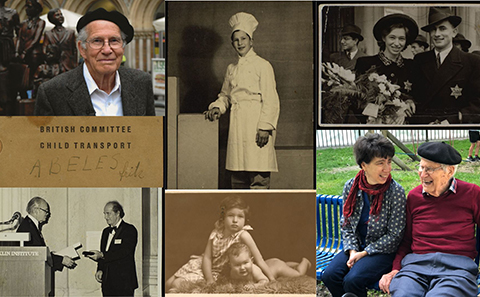From fleeing Hitler to revolutionising space exploration: Fascinating archive comes to Southampton

The life story of a teenager who fled Nazi persecution on the Kindertransport and went on to become a world-renowned physicist is told through his archive, on show for the first time at the University of Southampton.
Photos, letters and documents that belonged to Ben Abeles make up the unique and fascinating collection.
The archive contains short telegram-style letters between a teenaged Ben, evacuated to London aged 14 on a Kindertransport train in 1939, and his family back in Czechoslovakia. One, addressed to Ben’s father Ernest and dated 29 September 1941, reads: “Am healthy. Working in kitchen. With Stefan’s help perhaps opening little snack bar. Love to you.”
Helen Abeles, Ben’s widow who lives in Leicester, said: “Ben moved around a lot during the war, but through all that time he kept these letters with him. That tells us how precious they were to him. Ben always said his parents were the real heroes. They were the people that gave him life twice, by making the impossible decision to send him off on the Kindertransport.”
The archive features family photos dating back to the 1800s, which have only survived because Ben’s family gave them to a Christian relative during the Second World War, as well as the tag placed around Ben’s neck as he boarded the Kindertransport.
There is also the Stuart Ballantine Medal from the Franklin Institute in the United States, awarded to Ben in 1979 for his pioneering work to co-invent a thermoelectric generator used to power space probes. This was used on NASA’s Voyager 1 and Voyager 2, and on the Mars rovers Curiosity and Perseverance.
Post-war, Ben returned to Prague to search for his parents and older sister, but they had tragically been killed at the Trawniki concentration camp in Poland.
He studied at university in Prague and then Israel, before moving to New Jersey in the United States in 1956, where he worked as a physicist for 53 years.
About Ben’s work and invention, Helen said: “It’s an extraordinary story because the technology Ben invented is still being used – it’s incredibly important to space exploration.”
Dr Charlie Ryan, Associate Professor in Astronautics at the University of Southampton, said: “Ben Abeles’ work has had a very significant influence on space exploration. He helped to develop a type of power source for spacecraft, using radioactive decay to produce power, which is the power source of choice for space missions where using solar panels is not feasible. It has been used on some of the most ground breaking missions ever launched, such as the Voyager probes that have explored the outer solar system and beyond.”
Ben was married to Ann (née Singer) from 1958 until she passed away in 2007, and they had three children. In 2009, Ben moved to Leicester to live with his second wife, Helen.
Ben passed away in December 2020, aged 95. His family has given his archive to the University’s Archives and Special Collections, home to the Anglo-Jewish Archive, one of the largest Jewish archives in Western Europe, comprising more than four million items.
Helen added: “To me, and to Ben’s children and grandchildren, having Ben’s archive at Southampton is very important because we know it will be looked after and used and, in some way, helps keep the family alive. Ben would also be happy to know that his archive is at Southampton. There are very personal items in the archive, but for his and his family’s story to be known and shared would be the most important thing to him.”